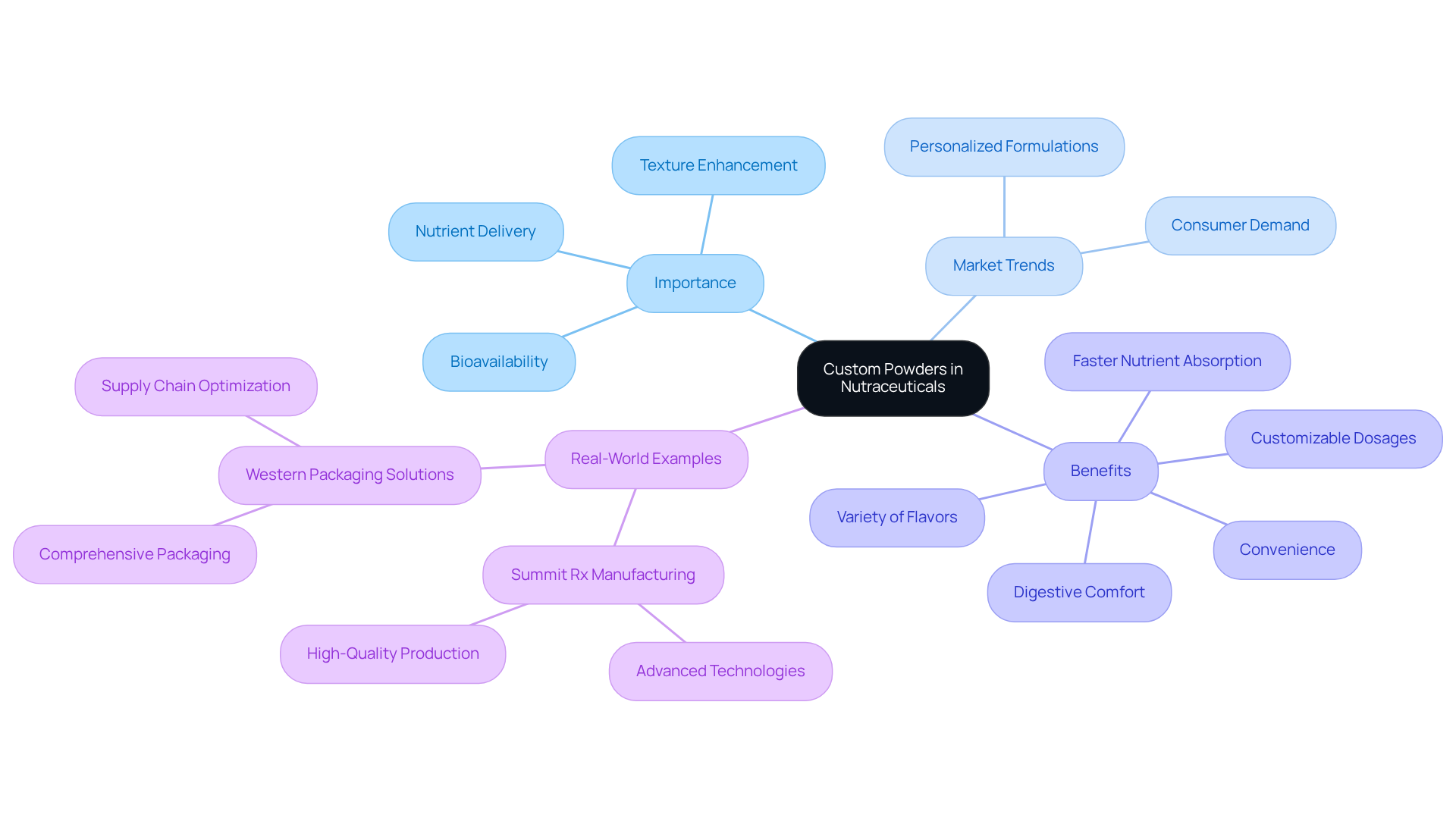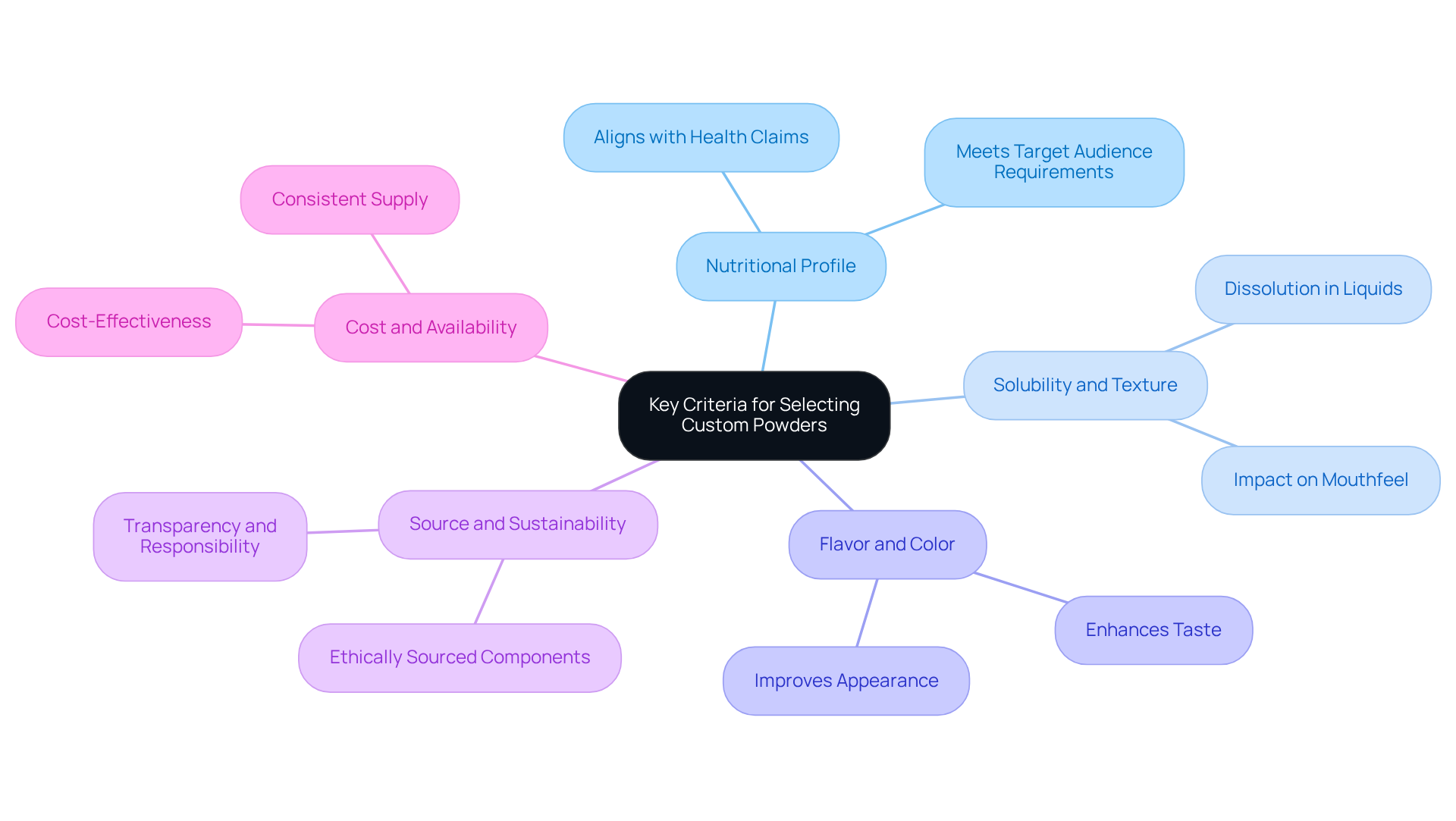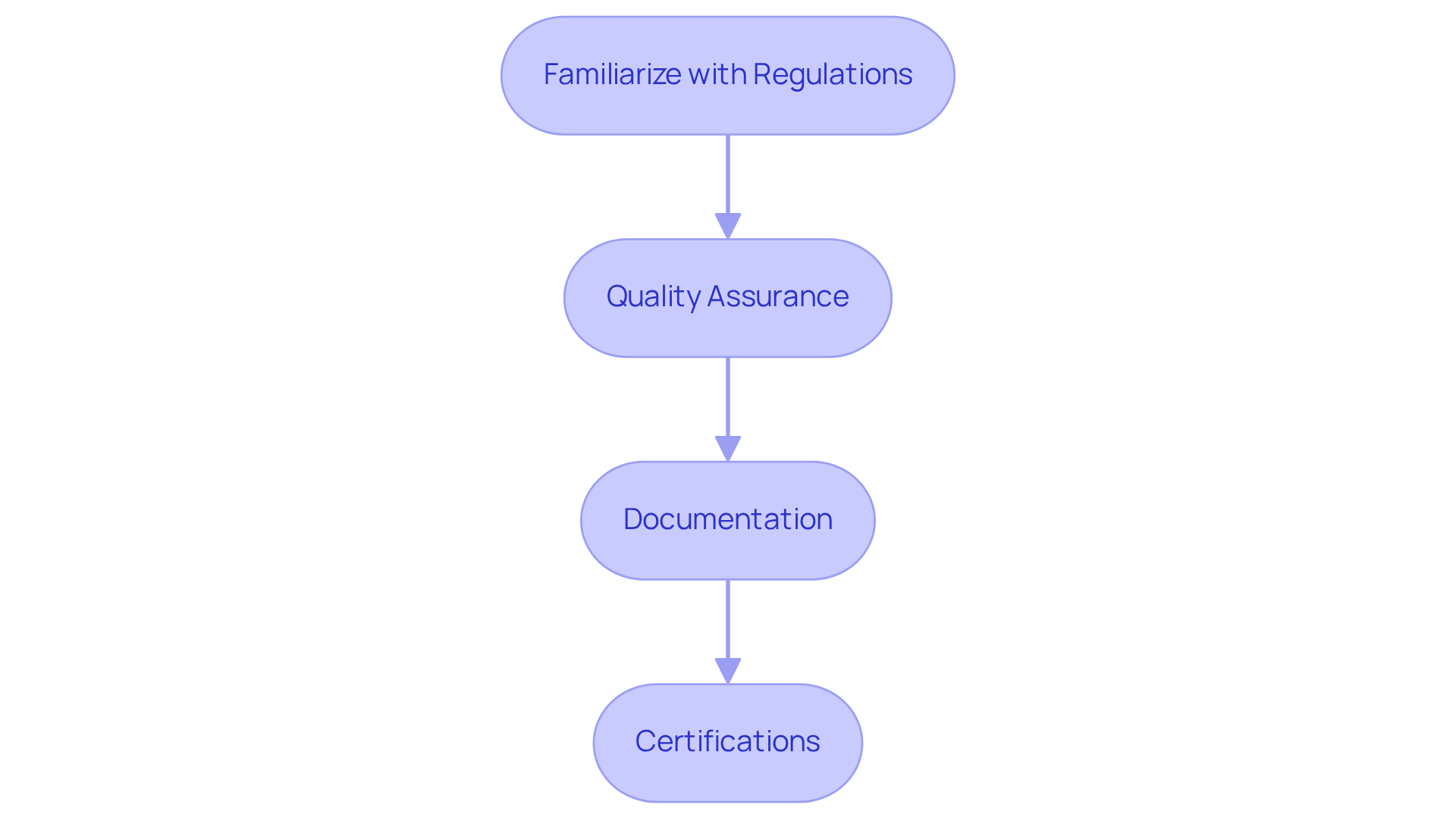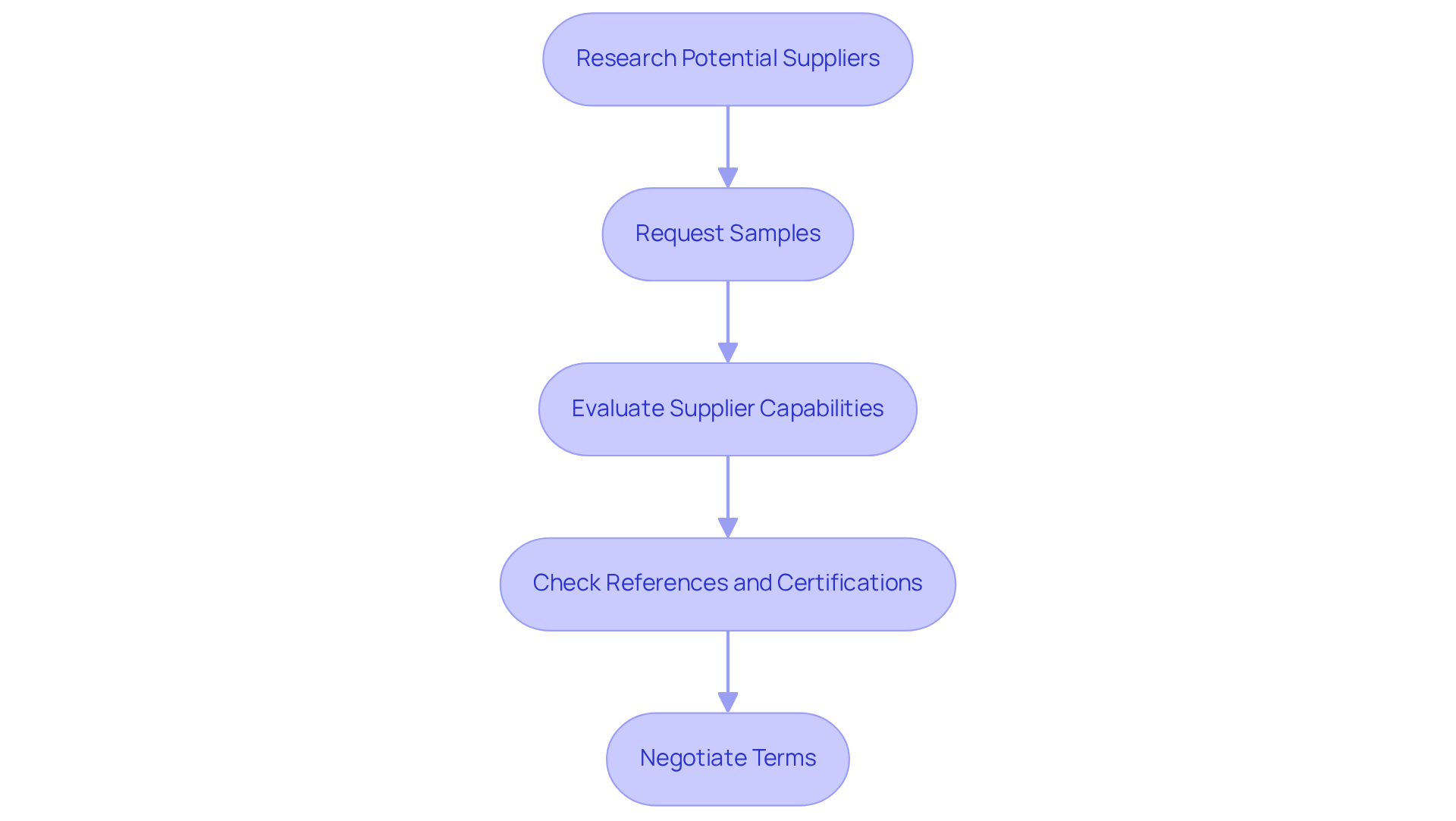Overview
The article delineates four crucial steps for selecting custom powders for nutraceuticals:
- Evaluating nutritional profiles
- Assessing solubility and texture
- Considering flavor and color
- Ensuring sustainable sourcing
Each of these criteria is vital in addressing consumer demands and adhering to regulatory standards. This guidance ultimately empowers manufacturers to create effective and appealing dietary supplements, reinforcing the importance of quality in product development.
Introduction
Custom powders are transforming the nutraceutical landscape, serving as essential building blocks for dietary supplements aimed at an increasingly health-conscious consumer base. As the demand for personalized and effective health products rises, it becomes imperative for manufacturers to understand how to select the right custom powders to distinguish themselves in a competitive market.
What critical criteria should businesses evaluate to ensure they not only comply with regulatory standards but also deliver high-quality, appealing products that resonate with consumers?
Understand Custom Powders and Their Importance in Nutraceuticals
Custom powders are finely milled components that are essential for creating dietary supplements and health items. They significantly support the nutraceutical sector by delivering vital nutrients, enhancing texture, and improving bioavailability. For producers, understanding the role of specialized materials is crucial for developing effective and marketable offerings. These substances, known as custom powders, can be customized to align with specific health claims, target audiences, and preferences, making them indispensable for product differentiation and branding.
Recent trends indicate a burgeoning market for personalized formulations in dietary supplements, projected to expand significantly by 2025. This growth is fueled by the rising demand for versatile and convenient supplement options that appeal to health-conscious consumers. Custom powders not only facilitate faster nutrient absorption but also provide a variety of flavors and formulations that enhance taste, making them more appealing than traditional pills or capsules. Moreover, their adaptability allows for seamless incorporation of custom powders into various foods and beverages, catering to diverse dietary preferences.
Real-world examples illustrate how tailored substances can enhance product texture and bioavailability. For instance, advanced manufacturing technologies enable the creation of high-quality materials that improve the coating and absorption of nutrients, thereby increasing their effectiveness. As Summit Rx states, "We take pride in our 47,000 sq.ft state-of-the-art manufacturing and packaging facilities, which allow us to create affordable tailored high-quality products." By leveraging these tailored solutions, companies can elevate their product offerings, ensuring they meet the evolving demands of consumers while distinguishing themselves in a competitive market. Additionally, powdered supplements can provide digestive relief, making them suitable for individuals with sensitive stomachs.

Identify Key Criteria for Selecting Custom Powders
When selecting custom powders for nutraceuticals, it is essential to consider the following key criteria:
- Nutritional Profile: Evaluate the nutritional composition of the powders, ensuring they align with your item's health claims and meet the requirements of your target audience.
- Solubility and Texture: Assess how effectively the substances dissolve in liquids and their impact on the item's mouthfeel, as these elements significantly influence customer satisfaction.
- Flavor and Color: Choose substances that complement or enhance the taste and appearance of your final product, as these qualities greatly attract customers.
- Source and Sustainability: Examine the procurement of the substances, focusing on sustainable and ethically sourced components to meet consumer demand for transparency and responsibility.
- Cost and Availability: Evaluate the cost-effectiveness of the substances and their availability to ensure a consistent supply and adherence to budget constraints.

Ensure Regulatory Compliance and Quality Standards
Compliance with regulatory standards is non-negotiable in the nutraceutical industry. To ensure your custom powders meet necessary regulations, follow these essential steps:
- Familiarize with Regulations: Understand the regulations set forth by governing bodies such as the FDA or EFSA regarding dietary supplements. Familiarity with these guidelines is crucial for compliance.
- Quality Assurance: Implement quality assurance protocols to ensure that all custom powders meet safety and efficacy standards. This includes rigorous testing for contaminants and verifying ingredient authenticity, which are vital for maintaining consumer trust.
- Documentation: Maintain thorough documentation of sourcing, testing, and compliance processes to provide transparency and accountability. Comprehensive records are essential for demonstrating adherence to regulatory requirements.
- Certifications: Seek suppliers that hold relevant certifications (e.g., GMP, ISO) to ensure they adhere to industry best practices and quality standards. Partnering with certified suppliers reinforces your commitment to quality and compliance.

Source and Evaluate Custom Powder Suppliers
Sourcing and evaluating custom powders suppliers is a critical process that demands careful attention to several essential steps to ensure quality and reliability.
-
Research Potential Suppliers: Begin by identifying suppliers who specialize in custom formulations for nutraceuticals. Prioritize those with a solid reputation and positive client feedback, as a supplier's reputation is paramount in the nutraceutical industry, where product quality directly impacts consumer health. Notably, the dietary supplements market is projected to reach approximately USD 35.6 billion by 2032, expanding at a CAGR of 5.2%. This underscores the importance of partnering with quality suppliers in a growing market.
-
Request Samples: Before committing, it is advisable to request samples of the powders. This allows for the evaluation of their quality, solubility, and flavor, ensuring they meet your specifications and customer expectations.
-
Evaluate Supplier Capabilities: Assess the supplier's production capacity, lead times, and their ability to fulfill your specific requirements. Effective supply chain management is vital, enabling manufacturers to respond swiftly to market changes and maintain customer satisfaction. This is especially crucial in the nutraceutical sector, where timely delivery can significantly influence business operations.
-
Check References and Certifications: Solicit references from other clients and verify the supplier's certifications. This step is essential to ensure compliance with industry standards, particularly in the nutraceutical sector, where adherence to health and safety regulations is critical. Industry specialists note that the growing health awareness among consumers globally is a significant factor driving the demand for high-quality nutraceutical offerings.
-
Negotiate Terms: Once a suitable supplier is identified, negotiate terms regarding pricing, delivery schedules, and quality assurance processes. Establishing clear terms fosters a mutually beneficial partnership, enhancing collaboration and trust.
By adhering to these steps, businesses can effectively source custom powders that meet their unique needs while aligning with industry standards, ultimately contributing to the success of their nutraceutical products.

Conclusion
Custom powders play a pivotal role in the nutraceutical industry, serving as essential components for dietary supplements and health products. Their ability to enhance nutrient absorption, improve product texture, and cater to consumer preferences makes them invaluable for companies aiming to differentiate their offerings in a competitive market.
The article outlines critical steps for selecting the right custom powders, emphasizing the importance of evaluating:
- Nutritional profiles
- Solubility
- Flavor
- Sourcing practices
- Regulatory compliance
By carefully considering these factors, businesses can ensure they choose high-quality ingredients that align with health claims and meet consumer expectations. Additionally, sourcing from reputable suppliers who adhere to industry standards is crucial for maintaining product integrity and consumer trust.
Ultimately, the significance of custom powders extends beyond product formulation; they represent a growing trend towards personalized health solutions that resonate with today's health-conscious consumers. As the demand for innovative and effective nutraceuticals continues to rise, companies must prioritize the selection of custom powders that not only enhance their products but also reflect their commitment to quality, sustainability, and consumer satisfaction. Embracing these practices will empower businesses to thrive in the evolving landscape of dietary supplements.
Frequently Asked Questions
What are custom powders and why are they important in nutraceuticals?
Custom powders are finely milled components essential for creating dietary supplements and health items. They provide vital nutrients, enhance texture, and improve bioavailability, making them crucial for effective product development in the nutraceutical sector.
How do custom powders benefit producers of dietary supplements?
Producers benefit from custom powders as they can be tailored to align with specific health claims, target audiences, and preferences, aiding in product differentiation and branding.
What trends are influencing the market for custom powders in dietary supplements?
There is a growing trend towards personalized formulations in dietary supplements, with a projected market expansion by 2025, driven by the demand for versatile and convenient supplement options among health-conscious consumers.
How do custom powders improve the consumption experience compared to traditional supplements?
Custom powders facilitate faster nutrient absorption and offer a variety of flavors and formulations that enhance taste, making them more appealing than traditional pills or capsules.
In what ways can custom powders be incorporated into consumer products?
Custom powders can be seamlessly incorporated into various foods and beverages, catering to diverse dietary preferences and enhancing the overall product experience.
What are some real-world applications of custom powders in enhancing product effectiveness?
Advanced manufacturing technologies allow for the creation of high-quality materials that improve the coating and absorption of nutrients, thereby increasing their effectiveness and bioavailability.
How do custom powders cater to individuals with sensitive stomachs?
Powdered supplements can provide digestive relief, making them suitable for individuals with sensitive stomachs, thus broadening their appeal in the market.




